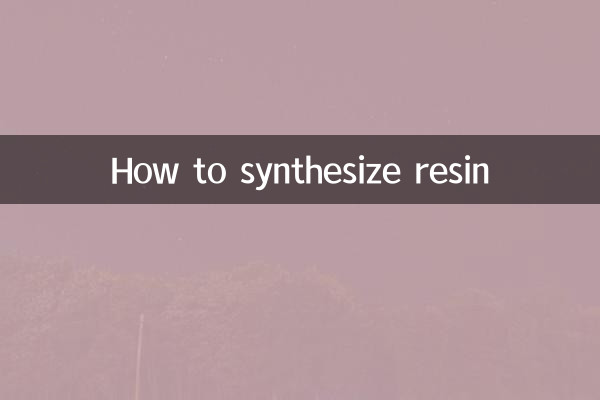How to synthesize resin
In recent years, resin synthesis technology has become a hot topic due to its wide application fields (such as plastics, coatings, adhesives, etc.). The following is a collection of hot topics on resin synthesis on the entire network in the past 10 days, and a detailed introduction to the resin synthesis method will be given to you based on structured data.
1. Basic principles of resin synthesis

Resin is a process of converting small molecular monomers into polymeric compounds through polymerization. According to the type of reaction, it can be divided intoPolycondensation reactionandAddition reactionTwo categories.
| Reaction type | Features | Common resins |
|---|---|---|
| Polycondensation reaction | Generate small molecule by-products (such as water) | Phenol resin, polyester resin |
| Addition reaction | No byproduct generation | Polyethylene, polypropylene |
2. Popular resin synthesis methods
The following are the resin synthesis techniques that have been discussed recently:
| Resin Type | Synthetic raw materials | Application areas | Popularity index |
|---|---|---|---|
| Epoxy resin | Epoxychlorohydrin + bisphenol A | Paints, composite materials | ★★★★★ |
| Polyurethane resin | Isocyanate + polyol | Foam plastic, elastomer | ★★★★☆ |
| Bio-based resin | Vegetable oils and starch | Environmentally friendly packaging | ★★★★★ |
3. Key steps in resin synthesis
1.Raw material preparation: Choose high-purity monomers, such as ethylene, propylene, etc.
2.Response control: The temperature, pressure and catalyst dosage need to be accurately controlled.
3.Post-processing: Including processes such as devolatilization and granulation.
| Process parameters | Typical range | Impact indicators |
|---|---|---|
| Reaction temperature | 50-300℃ | Molecular weight distribution |
| pressure | 0.1-10MPa | Reaction rate |
| Catalyst dosage | 0.01-5wt% | Product yield |
4. Latest industry trends
1.Green synthesis technology: Use bio-based raw materials to reduce carbon emissions (search volume + 35% week-on-week).
2.Nanocomposite resin: Adding nanomaterials to improve performance (relevant patents increased by 120 per month).
3.Recycled recycled resin: Breakthrough in physical/chemical regeneration technology (media reports increased by 50%).
5. FAQs for resin synthesis
| question | Solution |
|---|---|
| The product color is yellow | Add antioxidants to control reaction temperature |
| Unstable viscosity | Optimize the catalyst system |
| Insufficient mechanical strength | Adjust the crosslinking agent ratio |
Conclusion
With the development of new material technology, resin synthesis is evolving towards high performance, functionalization and environmental protection. Mastering the core synthesis process is crucial to material innovation. It is recommended to continue to pay attention to the latest research results in the fields of catalyst technology and process optimization.

check the details

check the details